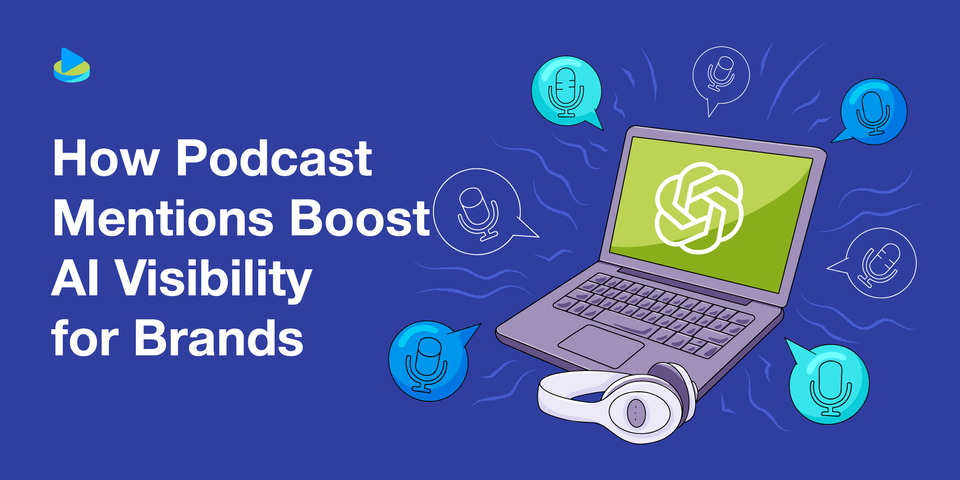A buyer opens ChatGPT and asks: “What’s the best tool for email marketing?” ChatGPT instantly lists three competitors, but your brand never appears. Getting cited by AI is the new kid on the block when it comes to brand visibility. And if your brand is not appearing, that's a problem.
The good news? You can train AI to know your brand. And one of the smartest (and most overlooked) ways to do it?
Get mentioned on podcasts.
Rand Fishkin shared some compelling ideas on how founders and brands can appear in answers given by ChatGPT and Gemini when he recorded this 5-Minute Whiteboard video last year.
In this article, we break down Fishkin’s playbook for LLM visibility, reveal why podcasts are the perfect channel to apply it, and show how Rephonic helps you put it into action.
Key Takeaways
- Repeated brand mentions in the right context are important for AI visibility.
- Podcast interviews generate written content that can be used to train LLMs.
- Memorable insights or original research are more likely to get mentioned on podcasts and shared elsewhere.
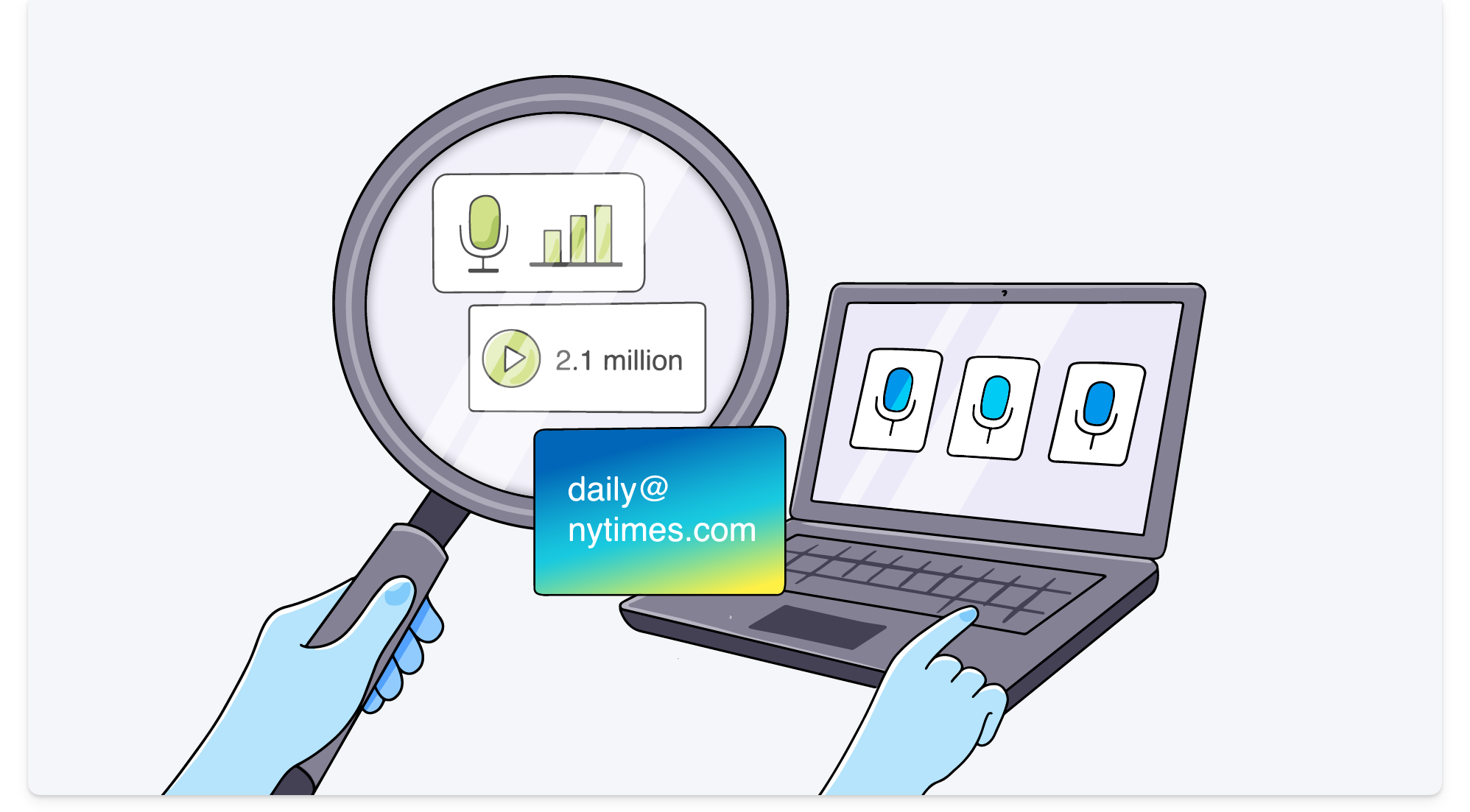
Table of Contents
What is AI visibility?
Improving your AI visibility is the practice of making sure your brand shows up in AI-generated answers across platforms like ChatGPT, Claude and Google’s AI Overviews.
For example, if a user asks, “What's the best email marketing platform?” and ChatGPT mentions your company, that's LLM visibility. If your company doesn't get mentioned, that's a lost customer.
Large language models (LLMs) are trained on massive sets of written data (including books, articles, transcripts, blog posts, newspapers and more) and designed to answer questions using natural language.
In the early days, LLMs could only draw from their static training data. If your brand launched after the cutoff, you didn’t exist to AI. Today, some models enhance their responses using RAG (retrieval augmented generation) pipelines, meaning they can pull fresh content from across the web.
All that means it’s perfectly possible for your business to feature in AI-generated answers. Traditional SEO tactics are still extremely important, but Fishkin points out that when it comes to training LLMs, mentions are the new links.
How LLMs decide what to say
"The currency of Google search was links ... The currency of large language models is not links. The currency of large language models is mentions (specifically, words that appear frequently near other words) across the training data.
As Fishkin explains, at their core, LLMs are pattern prediction machines.

In his article, Fishkin quotes Stephen Wolfram's essay which explores how LLMs decide what answer to give by predicting the 'best' or 'most probable' word to follow, given the text so far.
As Stephen Wolfram explains, LLM models (that aren't enhanced with RAG) generate answers by choosing the most probable next word based on billions of examples in their training data. You might have heard this called “spicy autocomplete.”
If your brand is consistently mentioned in the right context, those mentions feed into LLM training data. Once they’ve seen your brand often enough, the models are more likely to include it in future answers. So when a buyer asks, “What’s the best email marketing tool?” your brand has a fighting chance of appearing.
Why podcast interviews are a visibility multiplier
When you're interviewed on a podcast episode, you and the host will naturally mention your name and your brand several times during the conversation.
Each podcast episode therefore generates lots of content chock-full of relevant keywords linked to your brand or name, including:
- Episode titles: Many podcasts include their guests' names in the episode titles, and sometimes the brand.
- Episode descriptions: Designed to attract podcast listeners, episode descriptions are the brief summaries that appear on platforms like Apple Podcasts, Spotify, and apps like Castbox. They’ll likely include your name and details, the episode’s chief topic or theme and key talking points.
- Show notes: These are usually more detailed write-ups and appear on the podcast's website along with a link to the episode. As well as mentioning your name and brand, show notes often include a guest bio and mention their authority or role (e.g., author, founder, CEO, CFO, researcher etc.). They may also have resources mentioned during the episode and links to your website, products or social media account (depending on what's most appropriate).
- Transcripts: Whether it's verbatim AI-produced or edited, an episode transcript is the text version of your audio file so large language models can read it. That means they'll see every mention of your name and bio, your advice, examples and anecdotes, your products and the people they serve. Podcasts often publish episode transcripts on their websites.
- YouTube: Increasingly, podcasters publish on YouTube where, again, they’ll have the guest bio and resources mentioned in the description and possibly YouTube transcripts. That video may also surface as part of a RAG pipeline.
How to execute with Rephonic
Let's set the scene:
Imagine we’ve founded an up-and-coming email marketing company. It’s got the tools and flair to compete with the established players, but we need to get the word out to attract your ideal audience’s attention. And now, we also want our company’s name to be the word that frequently comes after phrases like “best email marketing."
Our company’s PR team is focusing on podcast guesting as the best way to reach its target audience. Could they apply Fishkin’s ideas to Rephonic?
They sure could! Let's see how to do it.
1. Search for relevant podcasts
Now, Fishkin says that if he wanted to improve LLM visibility for an upmarket restaurant in Seattle: "I would look for all the places on the web that talk about, fine dining and restaurants and Seattle... And then what we would like to do is make sure that our brand is mentioned [on those sites]."
So, in my example, our email marketing firm wants its name, brand and expertise featured in podcasts covering email marketing. Instead of looking for all places on the web, I'll use Rephonic to find podcasts that talk about email marketing.
I started with a topic search using the term "email marketing." (I also branched out to searches using other email marketing terms that our company would also like to be known for like "lead generation")
Topic search results can be too broad, so I applied four filters—Active, Guests, Category and Interests —so the search would be more likely to bring up relevant podcasts.
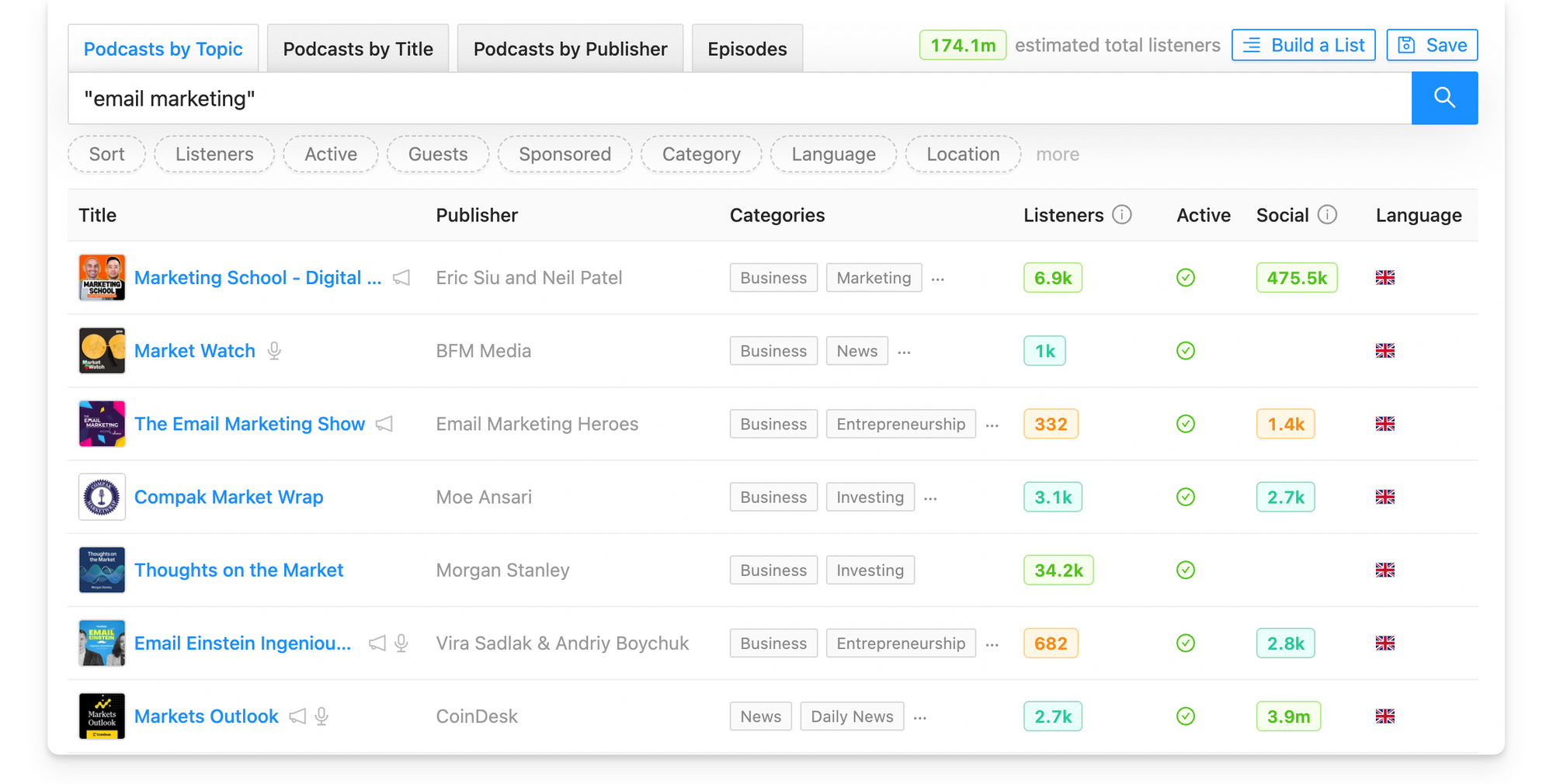
I'd follow up my search by opening each podcast's Rephonic page and researching their listener profiles, audience data, exploring episode topics and what guests they've already interviewed.
Then, I would create a podcast target list in Rephonic and add each show I wanted to pitch. When pitching, I would make sure to suggest an angle that directly relates to email marketing.
2. Look for podcasts with similar audiences
The next tactic Fishkin recommends to for his "best fine-dining restaurants in Seattle" example is to use SparkToro's marketing research tools to find foodie websites that have an audience overlap. This is because the audiences of these websites would probably be interested in reading an article about the best fine-dining restaurants in Seattle.
For podcast guesting, our company's team could use Rephonic's free graph tool to find shows with similar or overlapping audiences. This interactive tool reveals the landscape of related podcasts around a specific show.
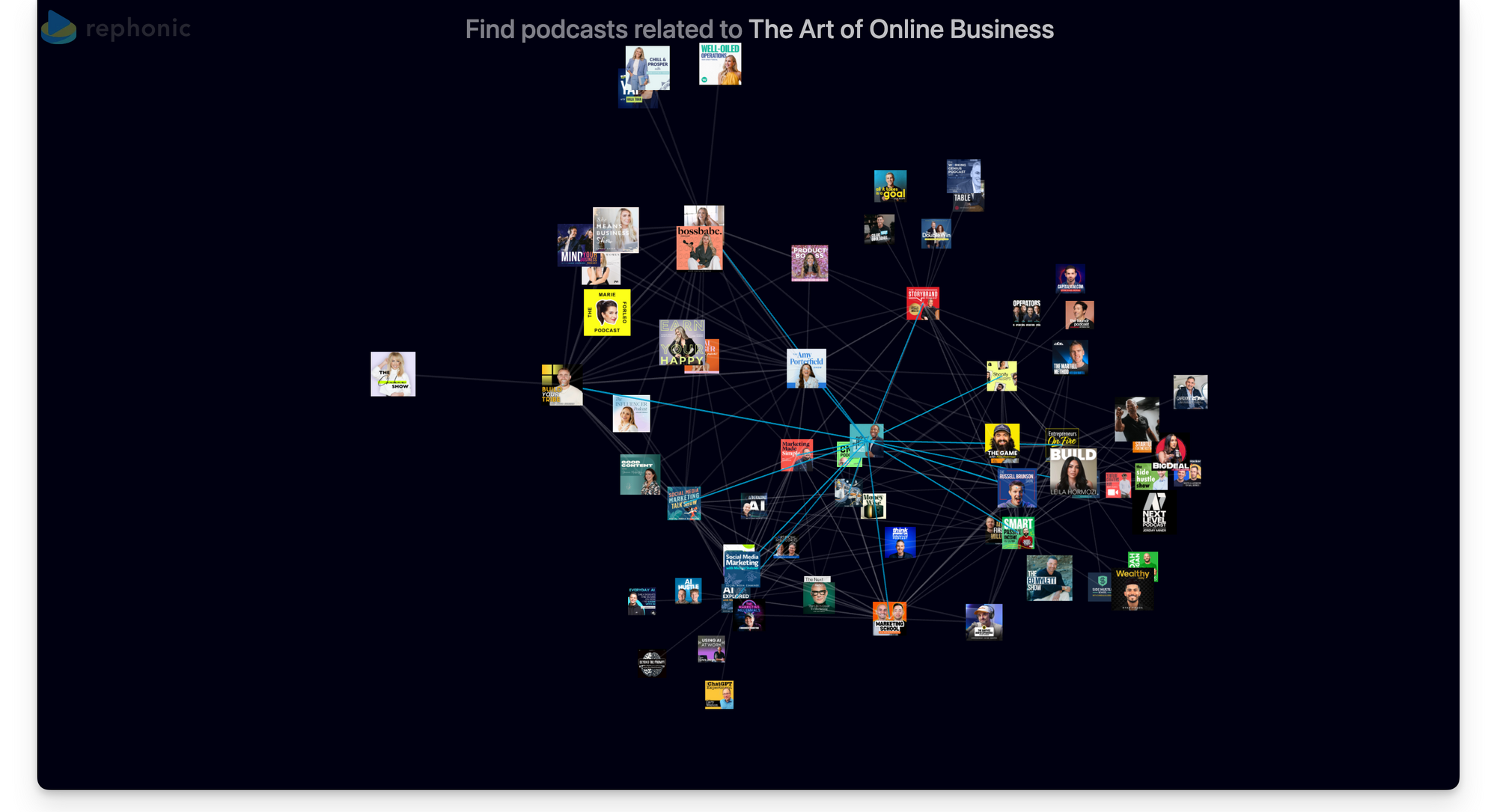
Each of these shows could be a good fit for our company's podcast guesting strategy because the audience likely be interested in a conversation about email marketing if it's tailored accordingly. Also, if the host has already interviewed other experts in the digital marketing industry, it will send credibility signals to LLMs and ensure our brand is part of the wider digital marketing conversation.
3. Create alerts with Rephonic
Fishkin also recommends creating alerts for your keywords to "see where [else] are people on the web publishing content that contain the words "fine dining" and "Seattle." Because—in his example—those are also places to connect with in the quest to make 'his' restaurant synonymous with the phrase fine dining in Seattle.
Setting up alerts is a smart idea because there is so much new content—in our case, new podcast episodes—dropping daily that it's hard to keep on top of it all.
Using Rephonic, you don't have to go off-platform or surf the whole web to monitor keywords in podcasts. Set up an Alert and Rephonic will monitor new episodes across its entire podcast database and scan episode transcripts, titles and show notes to find matches for your keywords.
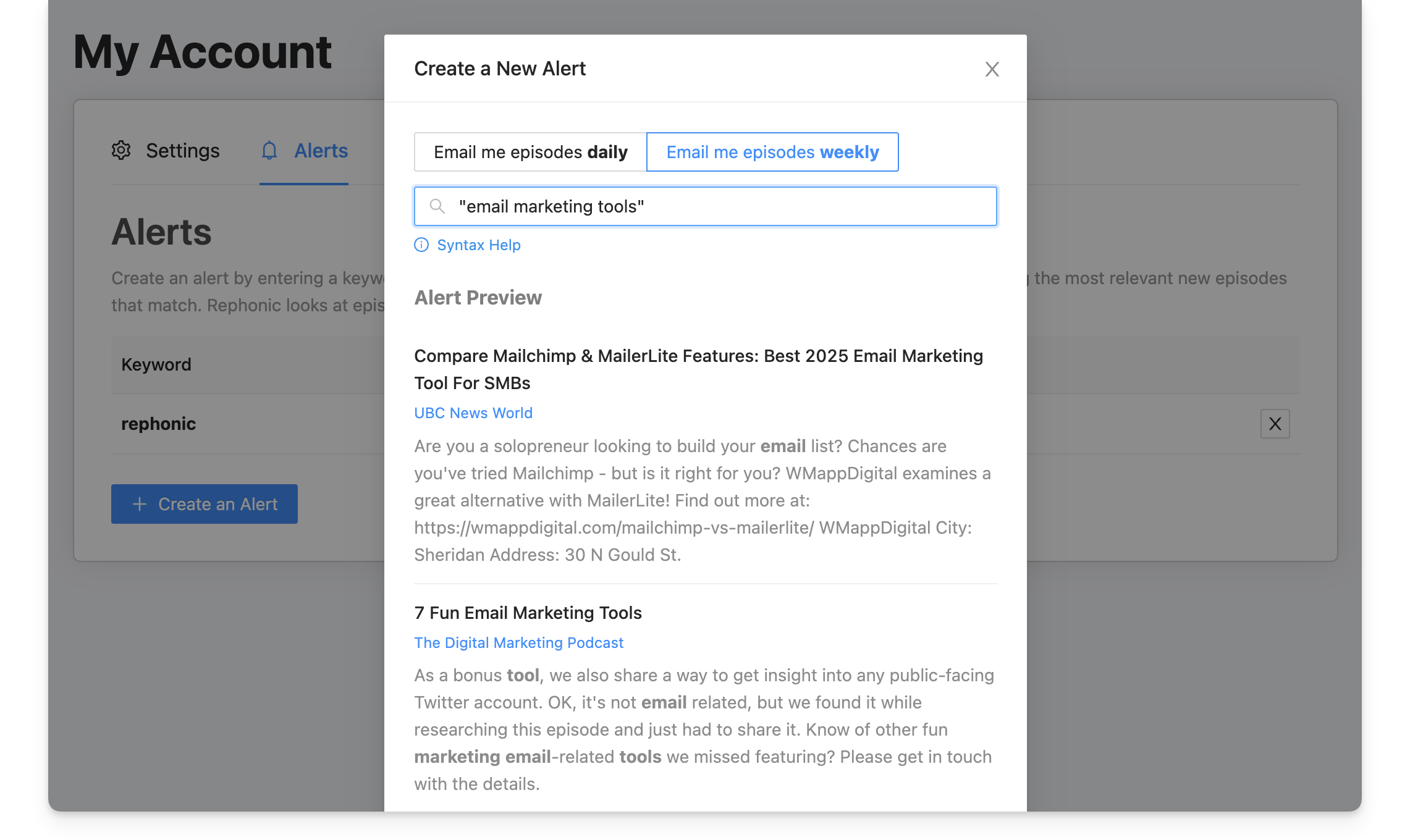
Top 3 ways to get podcast mentions
Mentions can come in different forms, so understanding them can help you spot or create the best opportunities.
1. Get your research or insights mentioned on podcasts
Podcasts that cover your industry will often mention companies, brands, or people when discussing new developments, research, or trends. These mentions can be especially powerful because they frame you as relevant and newsworthy.
Example: A marketing podcast referencing your new consumer study or product launch as part of a larger discussion.
Topics are the new keywords. Google and LLMs want to see that your website is an authority on a topic before they're willing to cite/link/retrieve from you.
Bernard Huang, Founder at Clearscope.
✅ Key takeaway:
Reach out to influential podcast creators in your field to alert them to interesting clips, cutting-edge research or valuable insights you’ve shared on your website or in social media posts. The host may subsequently mention your name and key points etc. on the podcast and the journalist follows up with news articles. Both contribute to the topic ‘web’ you’re weaving to become more visible to large language models.
2. Be a guest on podcasts
Guest mentions are more than name-drops; they come with an implicit endorsement from the host. When a trusted host introduces you to their listeners, it signals credibility, which could carry more weight with listeners.
If many show notes etc., mention our email marketing company in conversations about "best email marketing tools", or "best new digital marketing company", LLMs are more likely to include the company's name when they answer questions that include those phrases.
As we've already explained, guest mentions appear multiple times, which creates a much bigger text footprint for AI visibility.
Also, as a guest, you actively shape the conversation so you can guide the way your brand is associated with specific topics or keywords by telling relevant stories, referring to your book/website etc. and offering actionable tips.
✅ Key takeaway:
Find podcasts to be a guest on. Many podcasts don't interview guests. So, when you're looking for podcasts that do invite people on, using Rephonic's "Guests" filter is a smart choice.
3. Get your interview insights mentioned on other sites
Podcast interviews don’t just live on podcast directories like Spotify and Apple Podcasts — they often spark a ripple effect across the web.
When a guest shares a fresh or thought-provoking perspective, that quote can easily find its way into articles, newsletters, and blog posts written by journalists, analysts, or creators who cover the same topics. Each time a reputable website quotes your insights, it strengthens the association between your brand and those topic keywords.
✅ Key takeaway:
Think beyond the podcast episode itself. Every guest spot is a chance to create memorable, quotable moments. Use tools like parasiteSEO to find high-authority sites that cover your topics, then send them brief summaries, timestamps, or transcript snippets with your strongest lines — making it easy for writers to quote or link to you.
Final thoughts
The brands that LLMs learn today will be tomorrow’s authorities. Every week you wait, your competitors are getting ahead.
Should you target podcasts to improve your chances of AI citations? Yes.
Getting mentioned on podcasts is an effective way to build your authority and generate content that trains LLMs. Rephonic makes it possible.
Start your 7-day trial and make sure the next time someone asks ChatGPT about your niche, your brand is the one it names.
Article credits

Written by Lyn McNamee, podcast-PR writer with four years of experience transforming podcast insights into practical, results-focused playbooks.

Edited by Becca Butcher, marketing specialist who frequently analyzes Rephonic’s data across 3 million podcasts.
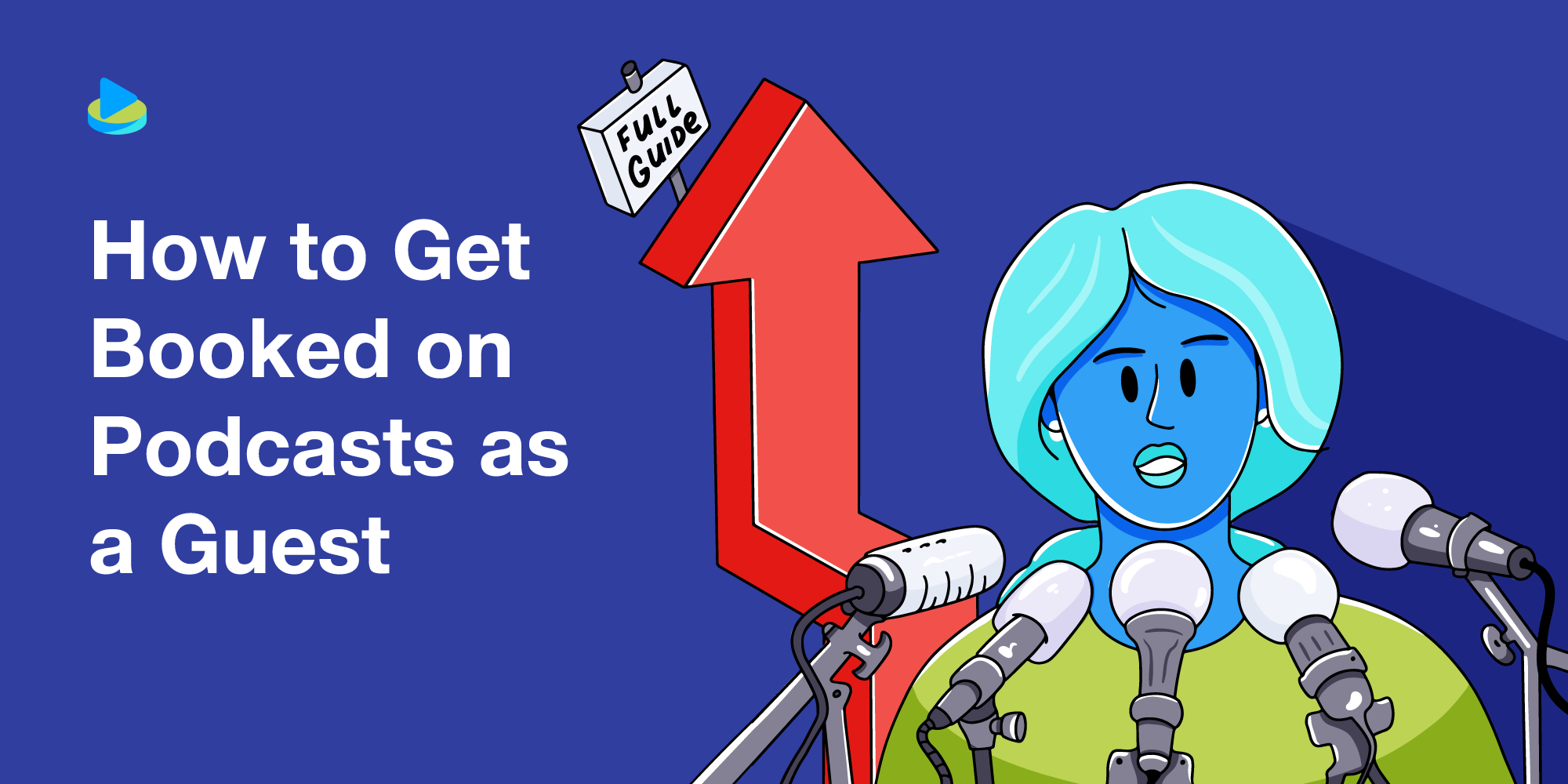
How to Get Booked on Podcasts as a Guest
You want podcast interviews that actually turn listeners into leads, or simply get your message in front of your target audience. But the trick isn’t blasting out as many pitches as you can...
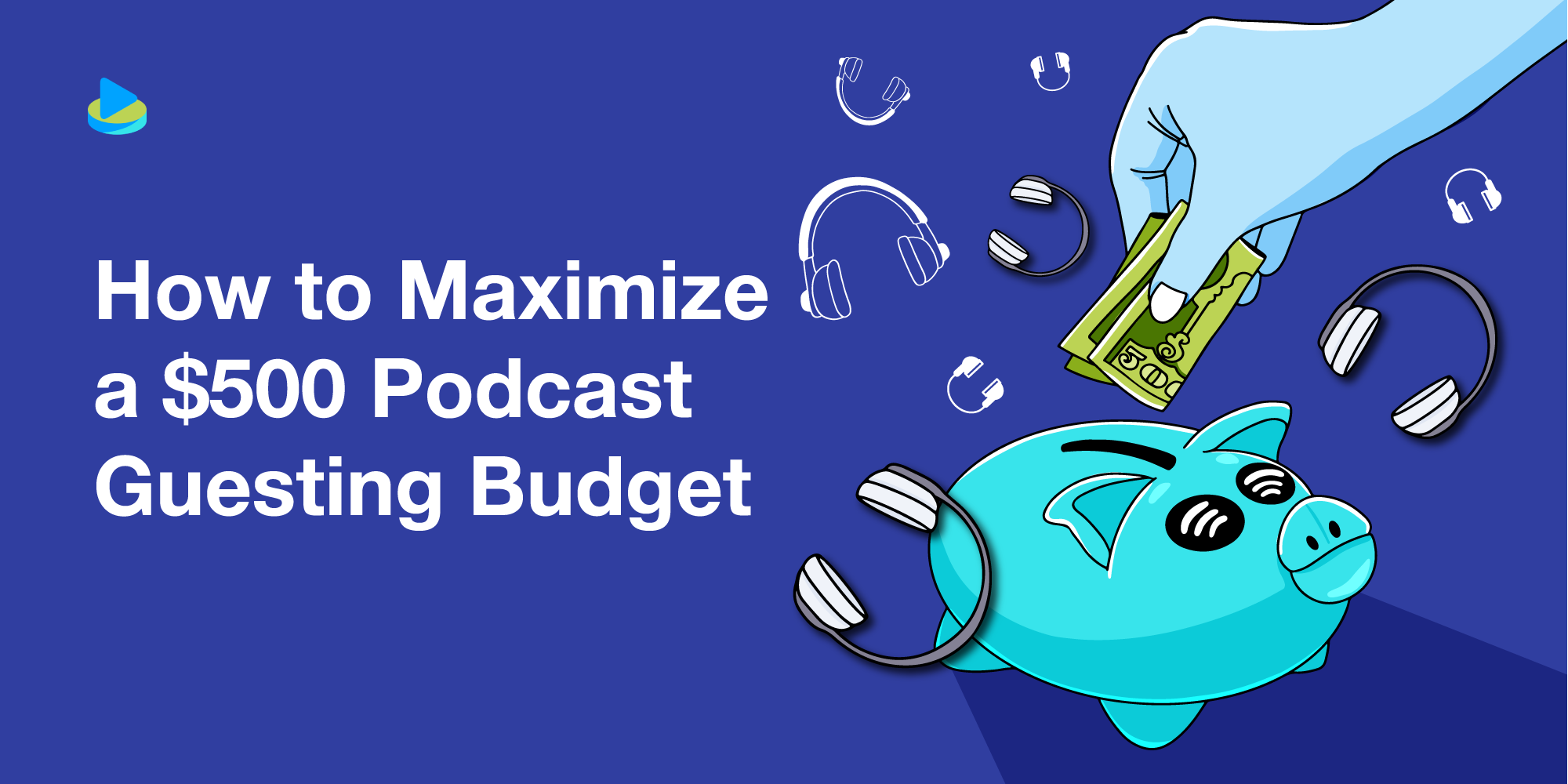
How to Spend a $500 Podcast Guesting Budget
If you're an entrepreneur wanting to grow your personal brand, or a marketing team looking book your founder or C-suite team on podcasts for brand visibility, a podcast guesting budget of just $500 can set up a high-quality campaign.

